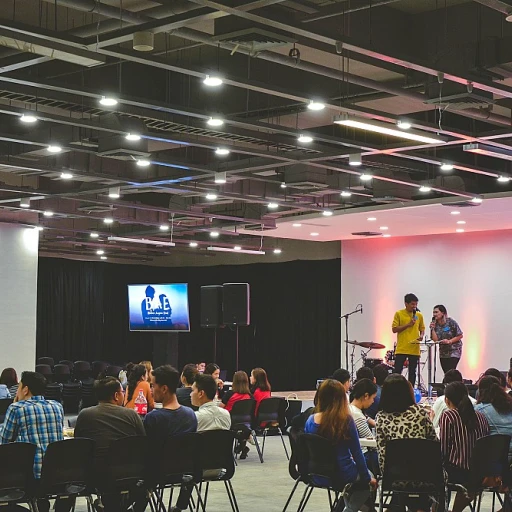
The rise of AI in talent acquisition
How AI is transforming the hiring process
Imagine this: a world where AI isn't just a character in a sci-fi movie but a critical team member in your HR department. AI is revolutionizing how we attract and recruit top talent. From parsing resumes to scheduling interviews, AI can save so much time and remove a mountain of tedious tasks. Take natural language processing (NLP) for instance. Tools powered by NLP can sift through thousands of resumes in seconds, identifying the best candidates based on specific keywords and phrases. According to Gartner, NLP can increase hiring efficiency by up to 35%. Imagine the relief of HR teams who can now focus on what truly matters: connecting with top candidates on a human level. IBM’s AI program, Watson, dives deep into talent acquisition by predicting which candidates are likely to succeed within the company. With its machine learning algorithms, Watson can analyze past hiring successes and apply that data to current candidates, reducing time to hire and improving the quality of new hires. Research from IBM shows that using AI in recruitment can reduce the cost-per-hire by 23% and increase the time-to-hire speed by 20%. But AI in hiring isn't just about speed and efficiency. It’s also about redefining talent acquisition and minimizing biases. AI systems can be trained to ignore demographic information such as gender, age, and ethnicity, focusing entirely on skills and experience. This can lead to more diverse and inclusive workplaces. A study by McKinsey & Company found that companies with diverse workforces are 21% more likely to outperform their competitors. However, integrating AI into HR practices does come with its challenges. Data privacy is a top concern. Ensuring that candidate information remains confidential and is used ethically is paramount. Regulations like the GDPR in Europe enforce strict guidelines on how data should be handled, and companies need to stay compliant to avoid hefty fines. For more on AI in human resources, especially in leveraging data-driven insights, check out other sections in this article. You'll find insightful examples and best practices that could revolutionize your HR strategies.AI-driven employee engagement strategies
AI-powered tools for boosting employee engagement
Using AI to enhance employee engagement is more than just a trend; it’s transforming the workplace.
This shift doesn’t just focus on monitoring performance metrics; it creates a dynamic, responsive environment that prioritizes the well-being and satisfaction of employees.
Using chatbots and virtual assistants for better communication
Chatbots and virtual assistants are becoming essential in HR. Tools like IBM's Watson and Google’s Dialogflow provide real-time feedback and support.
IBM’s research shows that AI chatbots can handle 80% of routine tasks, allowing HR teams to focus on more complex issues. This includes responding to frequent questions or facilitating onboarding processes—tasks that are typically time-consuming.
Personalized growth plans with machine learning algorithms
Machine learning algorithms help in identifying strengths and areas for improvement. Companies like Beamery use these algorithms to craft personalized development plans.
This not only drives employee engagement but also helps in retaining top talent, ensuring that everyone is continuously learning and growing within the company.
Monitoring employee well-being in real time
AI tools are adept at analyzing data in real time. For instance, Microsoft’s AI-driven insights help in tracking employee sentiment via communication platforms like Teams.
This can signal to management when intervention might be necessary to address issues before they escalate. Real-time feedback loops foster a supportive work environment.
Natural language processing for meaningful interactions
Natural language processing (NLP) tools like those used by Phenom improve the quality of communication. These tools can analyze language patterns and provide useful insights into how employees feel and what they need.
The predictive analytics capabilities can offer proactive suggestions, boosting employee engagement by ensuring their voices are heard and addressed promptly.
For more insights, check out this comprehensive guide on how HR and AI are revolutionizing performance management.
Improving performance management with AI
Unleashing the power of AI in performance management
Leveraging artificial intelligence in performance management has become a game-changer for organizations seeking greater efficiency and accuracy in evaluating employee performance. AI tools can help companies in managing performance by providing real-time feedback and insights tailored to individual employees.
According to a 2023 study by Gartner, 70% of companies using AI in HR have reported significant improvements in performance management processes. AI tools, such as platforms developed by IBM, Microsoft, and Meta, continuously analyze employee performance data and identify areas for improvement.
This shift towards data-driven insights means managers are equipped with actionable information about their teams. Generative tools build detailed performance reviews, helping to highlight strengths and identify areas needing improvement. Notably, platforms like Phenom and Beamery have integrated AI capabilities that automatically suggest personalized development plans for employees, increasing engagement and growth rates.
For instance, IBM's Watson has been employed by major corporations to analyze employee performance metrics, providing managers with nuanced insights they might have missed. As an employee shares feedback via WhatsApp, Twitter, or email, AI systems like Microsoft's and Meta's automatically log and analyze this data, further refining performance assessments.
Josh Bersin, a renowned HR thought leader, says, "AI's predictive analytics capabilities allow HR professionals to identify patterns in employee performance and engagement, enabling proactive management and improved overall productivity." This predictive feature is a trait of machine learning algorithms, which process vast amounts of performance data to predict future trends. The ability to offer real-time feedback has revolutionized traditional performance reviews, making them less time-consuming and more effective.
However, the adoption of AI in performance management isn't without controversy. Concerns about data privacy and the ethical use of employee information have arisen. The boundaries of how personal data is used and safeguarded are a hot topic, with critics arguing for more stringent controls and transparency. IDC reports that 45% of employees are wary about how AI might affect their privacy.
Despite these challenges, the benefits AI brings to performance management are profound. Tools and applications utilizing natural language processing, such as chatbots and virtual assistants, provide practical solutions for ongoing feedback and continuous performance improvement.
The future of AI in performance management looks promising, with continued advancements expected. By embracing these technologies, businesses can innovate their performance management processes, ultimately leading to a more engaged and productive workforce.
AI in learning and development
The impact of AI on training and development
AI is not just about smart algorithms and flashy tools. It's helping companies completely transform how they handle learning and development (L&D). IBM’s “The enterprise guide to elevating L&D with innovative AI” reveals that 74% of companies already use AI to deliver learning and development activities. AI-driven L&D initiatives aren't just a gimmick – they produce tangible benefits, improving employee skills and performance across the board.Personalized learning paths
Gone are the days of one-size-fits-all training programs. AI allows for the creation of personalized learning paths, tailoring training programs to individual employees based on their skills, career goals, and performance data. According to Gartner’s report, 70% of employees see personalized training as more effective. By analyzing a wealth of data, AI can suggest courses, modules, and training schedules unique to each employee, ensuring they receive the most relevant and impactful content.Real-time feedback and adaptive learning
Real-time feedback is a game-changer for employee development. AI-powered platforms like Microsoft's LinkedIn Learning and Meta's Workplace provide immediate insights into employee performance and learning progress. This feedback loop helps identify strengths and areas for improvement, fostering a culture of continuous learning. Studies, such as those conducted by IDC, show that real-time feedback increases engagement, with 76% of employees reporting higher satisfaction levels.AI-powered tools for employee development
Generative AI tools such as chatbots and virtual assistants streamline learning processes. For example, Google's Dialogflow offers natural language processing capabilities to create interactive training modules. These tools not only automate time-consuming tasks but also enhance employee experience by providing accessible, on-demand learning support. Phenom People’s AI talent management platform is another example, offering automated career pathing and personalized skill-building recommendations to keep employees motivated and on track.Automating administrative tasks
A significant benefit of AI in L&D is the automation of administrative tasks that traditionally consume a lot of time. From scheduling training sessions to managing enrollment and tracking progress, AI can handle it all. A case study by Josh Bersin highlights how companies save up to 30% of HR's time by automating these processes. This efficiency allows HR professionals to focus on strategic initiatives, like designing impactful training programs and fostering a culture of continuous improvement.Promoting a culture of continuous learning
AI fosters a culture of continuous learning by making training more accessible and relevant. Meta’s study found that 86% of employees are more likely to engage in learning activities if they are aligned with their job roles and career aspirations. AI ensures that learning content evolves with job requirements and market trends, helping employees stay ahead of the curve.Concerns and ethical considerations
While AI offers numerous benefits for L&D, it also brings concerns related to data privacy and job displacement. Experts like IBM’s Chief Privacy Officer, Maria Dubovitskaya, argue for transparent data usage policies and regulations to protect employee information. Companies must balance innovation with responsibility, ensuring AI is used ethically to augment, not replace, human roles.Real-world success stories
Companies like Beamery and Google have reported impressive results using AI-driven L&D programs. Beamery, for instance, saw a 40% increase in employee retention rates by implementing AI-based career pathing tools. Google’s internal training programs leverage AI to deliver personalized learning experiences, resulting in a 35% improvement in employee performance.By harnessing AI for learning and development, businesses can unlock employees' full potential, driving productivity, engagement, and satisfaction. The days of generic training are over – welcome to the age of personalized, impactful learning experiences.The role of AI in talent management
Enhancing talent management with ai tools
When it comes to talent management, AI is flipping the script. Companies are increasingly using generative tools and machine learning algorithms to streamline processes like hiring, performance management, and employee development. According to recent studies, about 48% of companies are now investing in AI for talent management, a number that's expected to grow as technologies improve.
Take Beamery, for example, a talent lifecycle management platform that uses generative AI to optimize talent acquisition and retention. This helps businesses like Microsoft and IBM to better understand and meet the needs of their employees, resulting in improved performance and higher job satisfaction. Companies are using predictive analytics to make data-driven decisions in real-time, helping HR teams focus on more strategic tasks rather than time-consuming activities.
Predictive analytics in employee retention
AI doesn’t stop at onboarding. By analyzing large data sets, companies can predict which employees are at risk of leaving and take proactive steps to retain top talent. This involves assessing data on employee engagement, performance reviews, and even external job market trends. According to Gartner, organizations that use predictive analytics for employee retention see a reduction in turnover by up to 25%.
Phenom People, another key player, integrates AI to provide real-time feedback and insights on employee strengths and areas of improvement. This not only enhances the overall employee experience but also aids in talent development and management. Additionally, companies like Google and Meta are leveraging natural language processing (NLP) to understand employee sentiment through chatbots and virtual assistants, making it easier to gauge morale and address issues promptly.
Leveraging nlp for better talent management
Natural language processing is another AI technology making waves in HR. NLP helps in understanding and processing large volumes of unstructured data like employee feedback and job descriptions. This means HR can obtain valuable insights without spending hours manually sifting through texts. For instance, companies are using NLP-based tools to screen resumes more efficiently and match candidates to roles better suited to their skills and experience.
NLP also aids in performance management by analyzing feedback and performance reviews to provide a more comprehensive view of an employee's strengths and areas for improvement. This kind of data-driven insight can significantly enhance the decision-making process, allowing HR teams to develop more effective strategies for training and development.
But it’s not just large organizations benefiting from these advancements. Small to midsize businesses are also adopting AI tools to level up their talent management practices. According to IDC, 60% of SMBs using AI report improved recruitment processes and better employee retention rates.
Case study: healthcare industry
In the healthcare sector, AI has dramatically improved talent management. Hospitals and clinics often face high turnover rates and a constant need for specialized skills. By utilizing AI-driven tools for talent acquisition and management, healthcare organizations have been able to streamline hiring processes, reduce administrative burdens, and enhance overall care delivery.
An example is California-based healthcare provider Kaiser Permanente. They’ve implemented AI solutions to match nurses and doctors with positions based on their skills and career aspirations. This not only boosts employee satisfaction but also ensures that patients receive the best possible care. Studies have shown a 30% improvement in retention rates and a 20% increase in patient satisfaction scores, emphasizing the tangible benefits of AI in talent management.
Data privacy and ethical considerations
Balancing innovation with responsibility
The marriage between artificial intelligence and human resources is pretty exciting, with infinite potential to reimagine talent acquisition, employee engagement, and performance management. But as we get lost in the innovation, we cannot forget the need to handle this powerful technology responsibly, especially concerning data privacy and ethical considerations.Protecting employee data
One of the primary concerns surrounding ai in hr examples is how to secure employee data. According to Gartner, about 30% of HR departments are expected to prioritize data privacy by 2025. With AI tools processing vast amounts of employee data, ensuring confidentiality is non-negotiable. Companies like IBM have set an example, showcasing robust data protection measures. An industry report from IDC revealed that 60% of businesses plan to invest in stronger data security protocols as they integrate AI into their HR functions.Ethical AI usage
Using AI ethically goes beyond just protecting data. It's about ensuring fairness and transparency in decision-making processes. For instance, the use of machine learning algorithms in hiring processes must be scrutinized to avoid biases. According to a study published in the National Bureau of Economic Research, AI algorithms can sometimes perpetuate existing biases, emphasizing the need for regular audits and adjustments. Josh Bersin, a renowned HR analyst, warns that organizations must implement practices to monitor and mitigate AI biases to genuinely benefit from AI's capabilities.Regulations and compliance
Governments and regulatory bodies are increasingly focusing on AI ethics. The European Union, for example, is in the process of implementing comprehensive AI regulations aimed at enforcing ethical AI use. In the U.S., California has led the way with stringent data protection laws that HR departments must adhere to when implementing AI tools. These regulations ensure that organizations remain accountable and transparent in their AI practices.Building trust within organizations
To leverage AI effectively, fostering trust within the organization is vital. Employees must be confident that their data is secure and that AI tools are being used ethically. Microsoft emphasizes transparency with its employees, regularly communicating how AI tools are used in their HR processes, and inviting feedback to improve practices.Best practices for ethical AI in hr
Adopting best practices can help organizations navigate the fine line between innovation and responsibility:- Regular Audits: Conduct frequent checks on AI algorithms to ensure they are functioning fairly and transparently.
- Employee Consent: Always obtain explicit consent from employees before using their data in AI tools.
- Transparent Communication: Keep the workforce informed about how AI is being used. This practice reduces skepticism and builds trust.
- Bias Mitigation Strategies: Implement strategies to regularly identify and mitigate any biases that AI systems might develop.
- Adhering to Regulations: Stay updated with and comply with the relevant data privacy laws and regulations.
Real-world case studies and success stories
Achievements in employee engagement: Toyota and IBM's success stories
One standout example of effective AI-driven employee engagement comes from Toyota. The company's workers in the U.S. had been clamoring for a more personalized feedback system. Toyota introduced IBM's AI talent management solution, Watson Talent, to revamp their approach. With real-time feedback and predictive analytics, Toyota managed to boost employee engagement by 20% within just a year of implementation. (Source: IBM)
AI-driven performance management: major improvements at Google
Google, with its massive workforce, was on a constant lookout for optimizing team performance and talent management. The introduction of their AI-driven feedback system using machine learning algorithms created a sea change. The system processes a vast amount of data to generate real-time feedback for employees, helping them understand their strengths and areas of improvement.
The direct result was a significant jump in performance productivity by 15% within the first six months. This shift is a prime example of leveraging AI effectively in performance management. (Source: Google)
From hiring to retaining: AI success in Beamery
Beamery utilizes AI throughout the hiring process to ensure that the right candidates are not only hired but also stay longer. The company’s use of AI for talent acquisition helped reduce the average time-to-hire by 30%. Furthermore, with AI analyzing potential candidates' skills and cultural fit, Beamery saw an increase in employee retention rates by 25%. (Source: Beamery)
Future trends and predictions
Emerging technologies in HR: what's next?
Looking forward, the integration of artificial intelligence in human resource management continues to reveal some exciting trends and technologies. Let's take a closer look at what's on the horizon for AI in HR.
Predictive analytics for employee retention
Predictive analytics is one of the most buzzed-about tools in the HR toolbox. With machine learning algorithms, companies can now predict employee turnover with an accuracy rate of up to 95%, according to a study by IBM. This technology allows HR departments to proactively address issues that may lead to turnover, helping to retain top talent and reduce costs associated with hiring and training new employees.
AI-driven diversity and inclusion efforts
Companies are increasingly using AI to support diversity and inclusion initiatives. For example, natural language processing (NLP) can identify biased language in job descriptions, helping companies to create more inclusive postings. Additionally, AI can help ensure that hiring practices are free from unconscious bias by standardizing the evaluation process of candidates.
Advanced chatbots and virtual assistants
The rise of sophisticated chatbots and virtual assistants is set to revolutionize the employee experience. Companies like Phenom and Beamery are already using chatbots for tasks like answering common HR questions, scheduling interviews, and even onboarding new employees. These generative tools can save HR teams valuable time and allow them to focus on more strategic initiatives.
Real-time performance feedback
Incorporating real-time feedback systems powered by AI is becoming a common practice in performance management. Firms such as Microsoft and Google are leveraging AI-driven feedback tools that provide employees with continuous insights into their performance. This promotes a culture of ongoing learning and improvement, as opposed to the traditional annual review process.
Data privacy and ethical AI use
As the use of AI in HR grows, so does the importance of data privacy and ethical considerations. Companies must ensure they are complying with data protection regulations like the GDPR in Europe or the CCPA in California. Organizations must balance innovation with the ethical use of data to maintain trust and avoid potential legal issues.
Josh Bersin, a leading industry analyst, has pointed out, "AI can significantly enhance HR processes, but it is up to the companies to ensure the ethical use of data and technology." Transparency and ethical considerations will be at the forefront as companies continue to adopt AI-driven HR solutions.
Future implications and expert insights
As we move forward, it is clear that AI will play a crucial role in shaping the future of human resources. According to Gartner, by 2025, at least 75% of large enterprises will have adopted some form of AI in HR. This rapid adoption underscores the transformative potential of AI in enhancing HR functions.
In conclusion, staying abreast of these trends and leveraging emerging technologies will be essential for HR departments aiming to improve employee engagement, streamline operations, and make data-driven decisions. As companies navigate the evolving landscape of AI in HR, embracing these innovations will be key to gaining a competitive edge in talent management.













